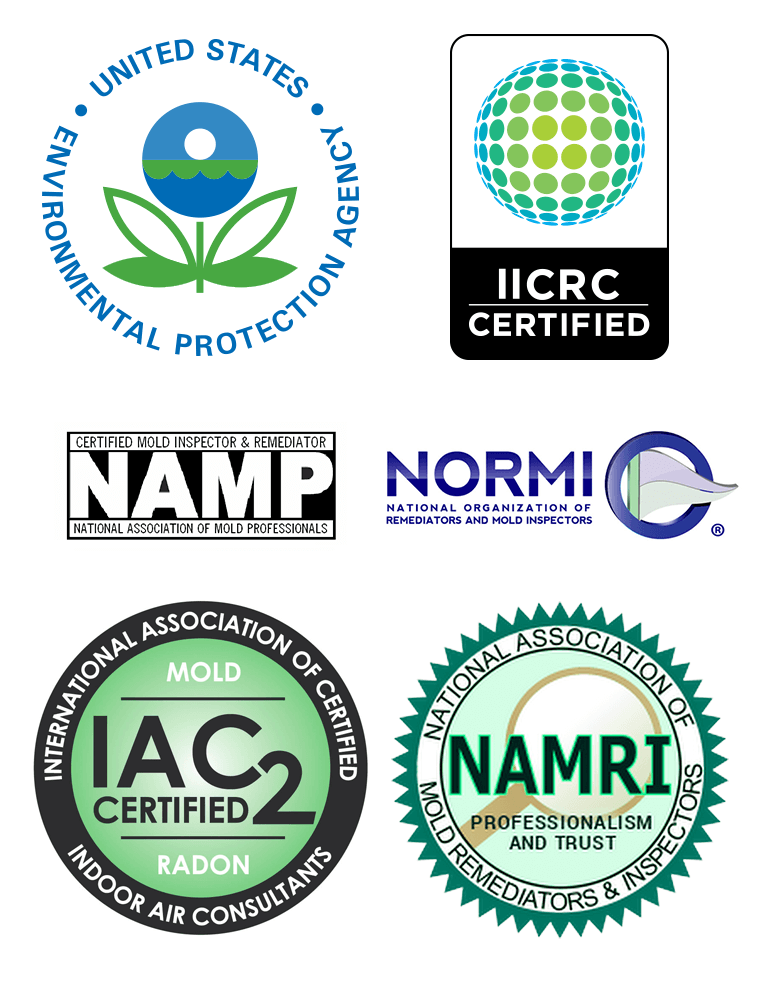“Guardian is the best ever. They took good care of me.”
24-HOUR EMERGENCY SERVICES
248-617-6531
How Mold Problems Can Affect Your Health
Mold spores are microscopic fungus that grows in most indoor and outdoor environments. Scientists cannot pinpoint an exact number of mold species, but according to the Centers for Disease Control & Prevention (CDC), estimates range into the hundreds of thousands. Some types of mold aren’t dangerous to human health, while others lead to chronic and severe health conditions.
Guardian Recovery Services can address any mold problem in your Michigan home or business after we understand the degree and type of infestation. Each type of mold has its own characteristics, growth patterns, and health risks. With a NAMP-certified Mold Remediator on staff, we can perform scientific mold testing that can typically locate and quantify your level of mold infestation.
It is important to know the science behind mold and its growth patterns in order to formulate an effective strategy for mold remediation. GRS technicians take multiple surfaces and air samples from throughout your property for mold testing. These samples are analyzed to determine the types of mold present, as well as the locations and levels of contamination in each area.
Common Mold Types
At Guardian Recovery Services, based in Madison Heights, our scientific mold testing can determine different mold types, as well as specific counts, that will show us the level of infestation and health risk. Harmful molds are classified as follows:
- Allergenic Molds are Hazard Class B and can produce allergies and allergic reactions.
- Pathogenic Molds are Hazard Class B and can cause health problems in those suffering from an acute illness.
- Toxigenic Molds are Hazard Class A and produce toxic substances that can lead to dangerous or even deadly health conditions. The presence of these fungi requires immediate attention.
Types of Mold by Color
Different types of molds come in varying colors and often trigger distinct allergic reactions. Watch out for obvious growth patches of these common mold types by color.
Black Mold
Black mold is a general term used to refer to a species of mold that is dark-green, gray, or black. It grows in warm, damp environments like basements, kitchens, showers, baths, and toilets. Most species of black mold release toxins that cause allergic reactions such as itchy eyes, itchy skin, nose stuffiness, wheezing, and coughing. More severe symptoms are headaches, exhaustion, fever, and difficulty when breathing.
White Mold
White mold species mostly grow in water-damaged areas in homes. These molds are usually white because their spores lack a color pigment. This is usually a result of the type of material or surface from which it grows. White molds are mostly powdery and quite hard to identify since they blend with the host material.
Yellow Mold
Yellow mold is also known as slime mold because it appears as bright slime. It mostly grows and breeds on wooden surfaces, food materials, walls, bathrooms, and tiles. Although yellow mold does not pose any serious health risks to healthy adults, it can infect children and people with immune system complications and respiratory problems.
Green Mold
There are thousands of green mold species, most of which pose significant health risks. Their color is often caused by the material they grow and feed on, the climate, or the region in which they live.
Green molds produce mycotoxins and are serious health hazards. They trigger allergies and can cause watery eyes, itchy skin, sneezing, or coughing.
Orange Mold
When this mold starts to grow, it forms tiny spots and becomes orange slime. It is often found in damp and humid areas like bathrooms and toilets but also grows on wood and food products like cheese, yogurt, and bread. Orange mold is not life-threatening but can cause significant damage to house structures and spoil stored food.
Brown Mold
Brown mold looks like dark patches on surfaces like wood and tiles. It is not dangerous but can damage structures and affect asthmatic or allergic people.
Any type of mold can become harmful or destructive if allowed to proliferate. When any mold is discovered in your Michigan home or business, call Guardian Recovery Services right away for mold testing and mold remediation.



